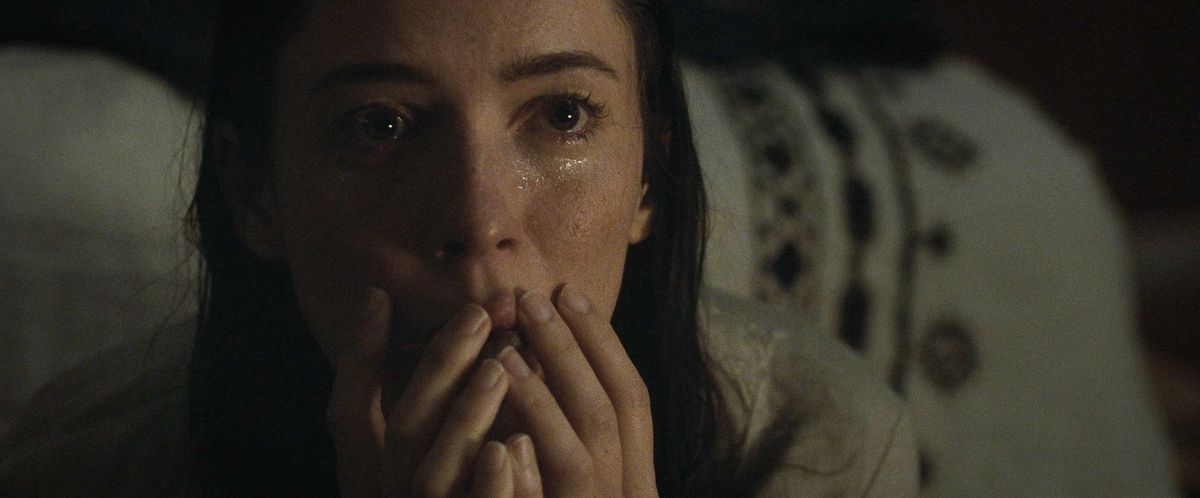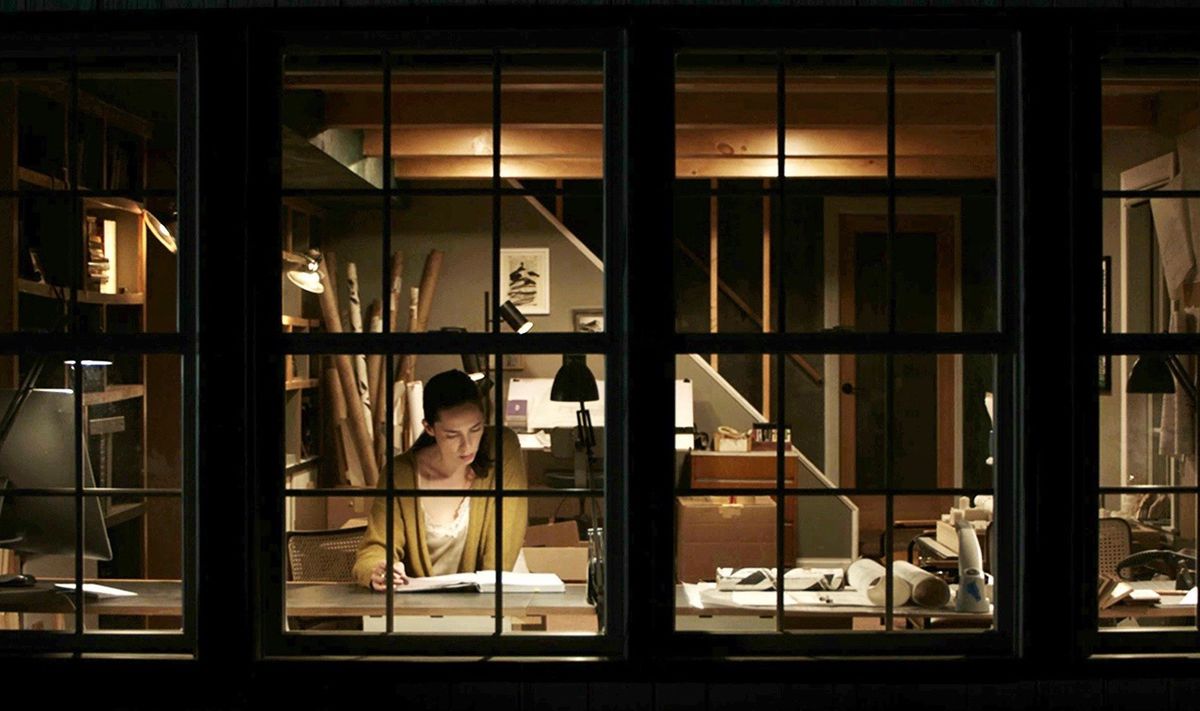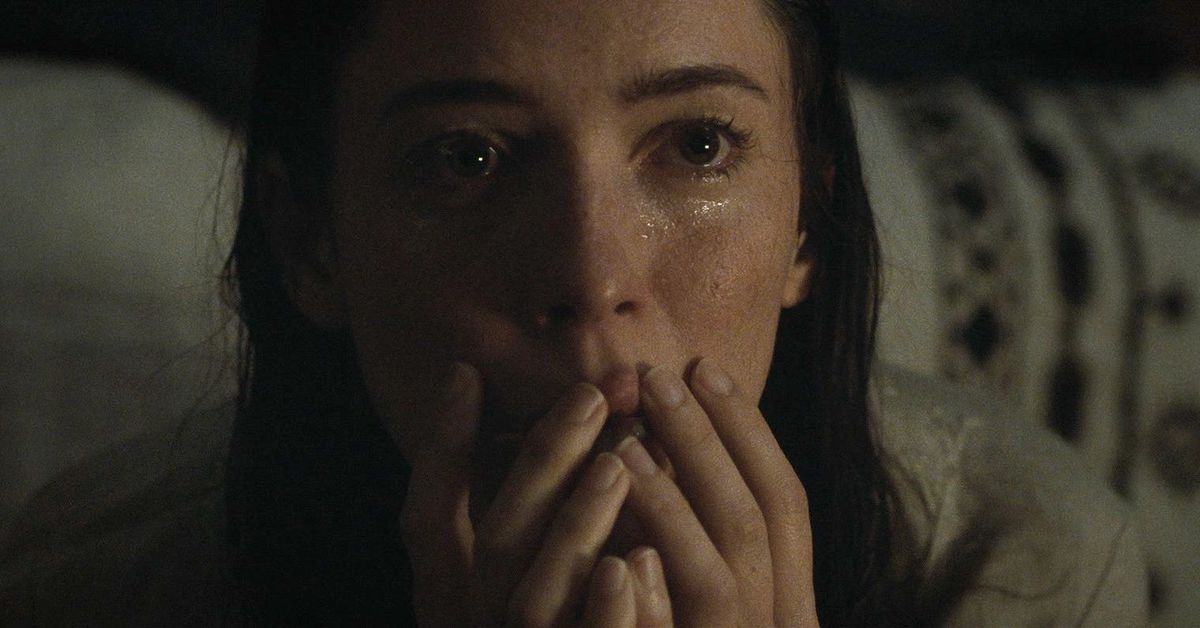We mourn a loss together, but we grieve alone. A horror film where despair and depression are threats as formidable as any boogeyman, The Night House opens at the point where mourning ends and grieving begins, watching as Beth (Rebecca Hall), a schoolteacher in upstate New York, returns from the funeral of her husband Owen (Evan Jonigkeit). A concerned friend walks her to the door, tells Beth to call her anytime, hands her a casserole, then leaves without joining her inside. As the sun sets over the nearby lake, Beth pauses, dumps the casserole in the trash, then waits for night to come.
It may not be arriving alone. Beth finds her nights are made restless by more than just the loss of her husband. Strange noises wake her from sleep. What appear to be bloody footprints mark the dock leading up to the back door. One night, shades of Personal Shopper, she receives texts from Owen, but when she wakes up, the texts have vanished. It’s all extremely troubling. More troubling: Beth starts waking up away from her bed, with no memory of having moved from one place to another.
Written by Ben Collins and Luke Piotrowski (the team behind the memorable 2017 film Super Dark Times) and directed by David Bruckner (part of the crew responsible for The Signal and V/H/S), The Night House is simultaneously a haunted-house story and a mystery. One striking early scene reveals the details of Owen’s death via a tense conversation between Beth and a student’s parent who’s trying to nudge Beth toward giving her son a higher grade, because after all, Beth was absent on the date she’d scheduled a make-up project. Beth replies with unmasked hostility, telling the parent that she was unavailable then because that was the day her husband rowed out to the middle of the lake and shot himself. And, no, she doesn’t know why.

Image: Searchlight Pictures
As the film progresses, Beth starts to piece the story behind the suicide together, but each new detail only deepens the mystery. Owen was an architect who designed their house, but why do the blueprints contain other plans for a similar house? Why did their friendly widowed neighbor Mel (Vondie Curtis-Hall) not tell Beth he sometimes saw Owen walking the woods at night, at least once with another woman? Why does their library contain books on the occult? And who’s that woman in the photograph on Owen’s phone, with her head turned away from the camera? She could almost pass for Beth, if Beth didn’t know better.
As the clues mount, Bruckner doles out scares in mounting intensity, a template for haunted-house movies dating at least back to 1944’s The Uninvited. It’s skillfully executed enough to make The Night House worth a look on technical merit alone, turning every corner of a luxurious lake house into a site of deep dread. But what’s memorable is the film’s interest in exploring ideas deeper than how scary it might be to be unexpectedly alone and seemingly surrounded by malevolent specters. The title has a literal meaning within the film, one better left unspoiled, but it also suggests the loneliness of Beth’s newly empty home and the shadows that threaten to envelop her, shadows that might be formidable threats even without the questions raised by Owen’s shocking death.
Owen, Beth confesses to her friends, was their marriage’s optimist. She was the one prone to spiraling darkness. What is she supposed to do now? But while her friends care about her, they also grow uncomfortable and impatient the more she talks about her loss. They offer bromides, dismiss her concerns, and steer her away from probing into Owen’s death. This kind of loss makes it hard to know what to do, what advice to offer, and all of it rings hollow to Beth’s ears anyway. Her nighttime visitors, however, have no trouble making themselves heard.

Photo: Searchlight Pictures
Hall plays Beth as a difficult woman who doesn’t always invite sympathy, even in her hour of need. Her grief takes the form of anger and suspicion. She behaves in ways that push other people away. Even her best friend Claire (Sarah Goldberg) isn’t sure what to do, beyond remaining present and listening. The film weaves a study of what it means to discover you’ve built your life over an abyss into the fabric of a multiplex-friendly horror movie, but it wouldn’t work without Hall’s deft, complex performance. She plays Beth as a woman shocked by her loss, but the real horror lies in the way the secrets she unearths seem to encourage her most self-destructive tendencies. When everything that gives her life meaning disappears, it starts to look like confirmation that it all might be meaningless. Maybe it’s time to pour another brandy and let the darkness in.
A tension enters The Night House’s home stretch as the demands of the genre start to eat away at the ambiguity — at least up to a point. The film fully reveals what Owen was up to prior to his death, but what accompanies that revelation, particularly its connection to Beth’s past, can be read a couple of different ways, and the film smartly refuses to tell viewers what to think. Though the final moments are sure to frustrate viewers uncomfortable with unanswered questions, the grayness suits the subject. Sometimes it isn’t just the houses that are haunted, the people within their walls are too. Some ghosts can’t easily be pushed out or explained away. Some of them, we have to live with.
The Night House debuts in theaters on August 20.
Polygon – All
Source link
Related Post:
- Night Delivery is a terrifying Japanese horror game about a courier having a very bad night
- Nine Inch Nails guitarist and Spec Ops: The Line director team up to make a ‘cosmic horror game’
- The Line director and Nine Inch Nails guitarist working on new cosmic horror game • Eurogamer.net
- Spec Ops: The Line Director And Nine Inch Nails Guitarist Open New Studio, ‘Cosmic Horror’ Game In Development
- Among Us mod takes you to a Haunted Mansion map
- The Sims 2 On Nintendo DS Is Haunted
- Lovecraftian Survival Horror Game Song of Horror is Available Now
- First-person survival horror game Horror Tales: The Wine coming to Switch next week
- Night Book, Wale Interactives’ occult horror, launches later this month for iOS, PC and console | Articles
- Bringing Horror to History in The Dark Pictures Anthology: House of Ashes
